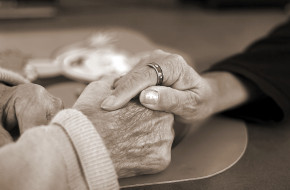Alzheimer’s disease is a brain disorder that progressively harms and ultimately destroys brain cells, leading to memory loss and changes in thinking and other brain functions.
People are at the greatest risk of developing Alzheimer’s disease if they are more than 85 years of age; they may have a reduced risk of developing memory loss-related diseases if they maintain a healthy lifestyle throughout their lives, according to the National Alzheimer’s Association.
Because people experience Alzheimer’s disease differently with varying symptoms, it is important that a doctor provide the diagnosis. Symptoms generally include the loss of problem-solving ability, impaired judgment, and loss of short-term memory.
Alzheimer’s disease occurs gradually. In fact, after a diagnosis is made, family members often say they believe they should have “seen it coming.”
As families learn to deal with a loved one’s Alzheimer’s diagnosis, they must become aware of the reality they face—the disease gets progressively worse and families should make plans to handle that decline.




